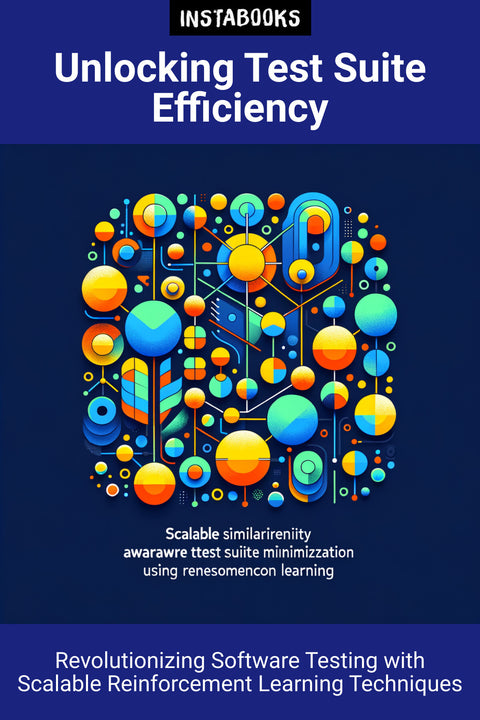
Unlocking Test Suite Efficiency
Revolutionizing Software Testing with Scalable Reinforcement Learning Techniques
Included:
✓ 200+ Page AI-Generated Book
✓ ePub eBook File — read on Kindle & Apple Books
✓ PDF Print File (Easy Printing)
✓ Word DOCX File (Easy Editing)
✓ Hi-Res Print-Ready Book Cover (No Logo Watermark)
✓ Full Commercial Use Rights — keep 100% of royalties
✓ Publish under your own Author Name
✓ Sell on Amazon KDP, IngramSpark, Lulu, Blurb & Gumroad to millions of readers worldwide
Introduction to Revolutionary Test Suite Minimization
In the dynamic and rapidly evolving field of software testing, scalability and efficiency are paramount. Unlocking Test Suite Efficiency explores groundbreaking techniques in scalable similarity-aware test suite minimization, focusing specifically on leveraging reinforcement learning to optimize test suite reduction without sacrificing effectiveness. This book unveils novel strategies designed to address and overcome the complexity of managing large test suites.
Diving into the Multi-Criteria Test Suite Minimization Problem
Diving deep into the core of test suite minimization, this book presents a detailed analysis of the Multi-Criteria Test Suite Minimization (MCTSM) problem. Readers will gain valuable insights into traditional challenges that have long impeded efficiency, understanding why many existing approaches fail to scale effectively in practice. The book compellingly argues for the integration of advanced techniques such as reinforcement learning to address these enduring issues.
The Power of TripRL and Similarity-Based Techniques
Central to this discourse is the innovative TripRL approach, which combines statement coverage, fault detection ability, and test coverage similarity through a sophisticated Integer Linear Programming (ILP) methodology. Readers are guided through its process, demonstrating how this approach provides a diverse and effective test suite. The seamless blend of ILP with reinforcement learning is shown to unlock significant scalability and efficiency enhancements for software testing enterprises.
Exploring Scalability, Efficiency Gains, and Practical Applications
This book offers an in-depth exploration of the real-world applications of these techniques, focusing on scalability and runtime efficiency. It highlights how TripRL's runtime is able to consistently deliver solutions in scenarios where conventional methods would falter. Filled with case studies, the book illustrates how significant gains in efficiency can be achieved, leveraging large-scale test suite data to maintain high effectiveness.
Charting Future Directions and Emerging Technologies
Concluding with a forward-looking perspective, the book explores emerging technologies and trends such as the METRA method and other unsupervised reinforcement learning strategies. Through an insightful analysis of potential future pathways, it equips readers with an understanding of how these advanced methods will continue to shape the realm of software testing.
Table of Contents
1. Understanding Test Suite Minimization- The Fundamentals of MCTSM
- Importance in Software Testing
- Challenges and Limitations
2. Traditional Approaches and Shortcomings
- Existing Techniques Overview
- Scalability Challenges
- Effectiveness Concerns
3. Introduction to TripRL
- Concept and Methodology
- Integrating Traditional Criteria
- ILP and RL Synergy
4. Leveraging Test Coverage Similarity
- Similarity-Based Selection
- Diversity in Reduction
- Case Studies
5. Scalability and Efficiency Enhancements
- TripRL's Linear Scalability
- Runtime Efficiency Gains
- Practical Implementation
6. Modern Methods Beyond TripRL
- Exploring FAST++ and FAST-CS
- Big Data Algorithms in Testing
- Comparative Analysis
7. Future Directions in Test Suite Minimization
- Emerging Trends and Technologies
- Potential Research Pathways
- Impact on Software Testing
8. Unsupervised Reinforcement Learning: METRA
- Introduction to METRA
- Scalability in RL
- Applications in Testing
9. Integrating Unsupervised Methods
- Enhancing Diversity with METRA
- Combining Techniques
- Future Potential
10. Real-World Applications and Case Studies
- Industry Examples
- Evaluating Success
- Lessons Learned
11. Challenges and Limitations in Practice
- Overcoming Pitfalls
- Balancing Complexity
- Opportunities for Improvement
12. Towards a Scalable Testing Future
- Synthesis of Key Insights
- Future Outlook
- Concluding Thoughts
Target Audience
This book is intended for software developers, testing engineers, and researchers interested in advanced software testing methodologies, particularly those focusing on test suite optimization and reinforcement learning applications.
Key Takeaways
- Understand the fundamentals of scalable test suite minimization and its importance in software testing.
- Explore the innovative TripRL approach combining ILP and reinforcement learning for test suite reduction.
- Learn about scalability and efficiency gains achieved through modern methodologies.
- Discover the future potential of unsupervised reinforcement learning methods like METRA.
- Gain insights from real-world case studies and practical applications of optimized testing techniques.
- Identify challenges, limitations, and potential improvement paths in current methodologies.
